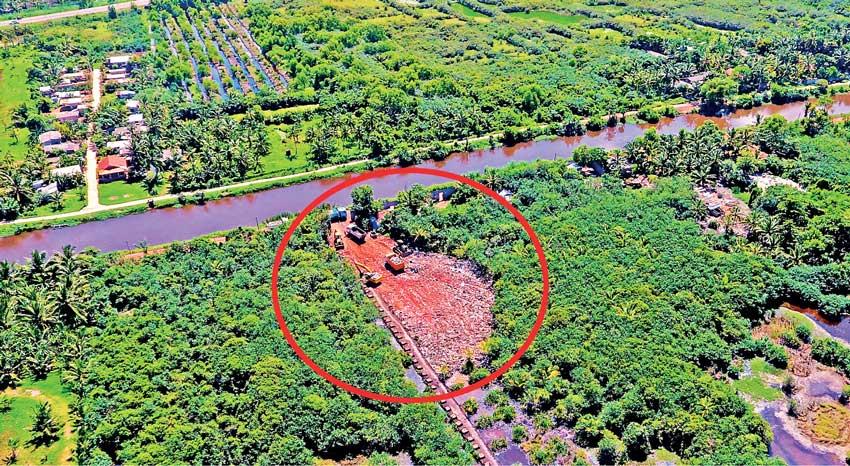Sri Lanka is not for Sale
Posted on March 8th, 2021
Courtesy The Daily Mirror

Parts of Muthurajawela Wetland cleared for private commercial constructions

Intending to build public opinion against the foreign private enterprises taking over lands on a large scale and causing irreversible impact on the environment, a forum named ‘Our Land is Not For Sale’ was formed recently with the participation of environmental activists and other civil groups movements in collaboration with the Centre for Society and Religion (CSR).
Today we see a tendency that the State mechanism has created room for selling lands and resources to large scale private enterprises. This has not only posed a threat to the forest cover but also to the coastal resources. Most ongoing development strategies seemed to be based on this.
Need for collective action
It is necessary that all concerned citizens and organisations work together to overcome challenges related to the environment. Today we rally here, as a first step to oppose the foreign private companies taking over our lands,” said Rev. Fr. Rohan Silva, the Director of the CSR. He said there was a need to remind the responsible authorities of the great saying by Mihidu Thera: we’re only caretakers of Earth, not its owners. We must protect it for our children.”
We are living in a context in which political systems take turns. We have a doubt about how our politicians talk and make decisions regarding certain vital issues. It is our intention to develop this country. There is a question which is the model they use to achieve this. The successive governments seems to have, maybe due to external influence, followed the same model,” Fr. Silva added. He said the gap between the rich and the poor was rapidly increasing around the world. Even in Sri Lanka most of the wealth is with a few people who accumulate a large amount of money and increase the poverty crisis while making the richer rich and the poor poorer. These are the outcomes that the model we have been following has given us. We are in dire need of an alternative model which could ensure sustainable development. A government often gives opportunities to private investors to implement their hidden agendas. One of the most tragic parts of this issue is selling thousands of acres of lands to these investors,” he lamented.
The Director of Environmental Conservation Trust and the Convener of the Lands and Agricultural Reforms Movement Convener Sajeewa Chamikara said, Today we see a tendency that the State mechanism has created room for selling lands and resources to large scale private enterprises. This has not only posed a threat to the forest cover but also to the coastal resources.” He said most ongoing development strategies seemed to be based on this. When analysing The ‘Saubagya Dakkma’ manifesto– Vistas of Prosperity and Splendour, Mr. Chamikara said that it reminded citizens of their caretaker role in protecting fauna and flora. The wanton destruction of natural resources violates the manifesto and even the environmental laws,” he added.
The National Fisheries Solidarity Movement’s convener Mr. Herman Kumara said, At a time the 73rd Independence Day was celebrated on February 4, Hambantota district farmers had launched a hunger strike urging the responsible authorities to resolve their issues related to the human-elephant conflict. They are in a situation where they cannot sleep as the elephants could enter their lands and either kill them or destroy their cultivation. It is necessary to develop a country but wanton destruction of forests cannot be tolerated and would not lead to sustainable development.”
The National People’s Council’s convener Chameera Perera said the lands were being sold based on neo-liberal principles. Explaining how neo-liberalism had entered the country he said the state had become structured. The Executive presidency was such a structure that neo-liberalism brought into the country. It is always citizens’ struggles that have made a great impact on the state. These neo-liberal policies have posed a threat to the land rights of the people. The Government in Sri Lanka is structured in such a way that allows room for the land grabbers in the guise of investors to sneak into the country,” he added.

Expressing his views at the forum the Government Trade Unions Workers Association’s Chairman D.M.D. Abeyratne said, People in this country will experience what is left for them soon. There is a question of how long the resources in this country will be protected. The governments try to sell the country’s resources to strengthen their power. The public sectors’ privatisation was evident after 1977. The then government started to sell lands and resources to investors. Thus, resources and the public sector were being gradually privatised and were given to foreign enterprises. The revenue that should have been gained for Sri Lanka was shifted to multinational companies.” He said many government institutions that had profits were being privatised and sold, adding that the human-elephant conflict had become a pestering issue. As the forest cover depletes due to development projects the elephants have started to come to the villages. They destroy the cultivations and even kill people. Even when the people protest against these issues, the Government seems to have little or no concern for them. Both the people and animals have no space as deforestation continues,” he noted. Mr. Abeyratne called on the citizens to give their collective support and show their resistance to the destruction of the environment.
Muthurajawela Sanctuary under threat
The Muthurajawela wetland was declared a sanctuary on Oct. 31, 1996, under the Fauna and Flora Protection Ordinance. It was also named one of the 41 internationally important wetlands in the country by the Asian Wetland Inventory of 1989. According to a study by the International Union for the Conservation of Nature, Muthurajawela is home to 209 species of animals and insects along with 194 species of trees, 40 species of fish, 31 species of reptiles, 102 species of birds and 48 species of butterflies. There are 18 out of 22 mangrove species in
Muthurajawela wetland.
Expressing his opinion on some landfilling attempts at the Muthurajawela sanctuary by private companies, the Muthurajawela Protection Organisation leader Anil Jayamaha said, Environmentalists have urged authorities to stop attempts to fill up Sri Lanka’s largest coastal wetland, the Muthurajawela sanctuary. For 73 years, we have not been able to choose a proper leadership. This has resulted in forming forums or organisations of this nature. We saw Government’s inefficiency when it allowed the destruction of about 5,500 hectares of valuable wetlands in Muthurajawela. He said the environmental laws in Sri Lanka, having identified the invaluable contribution of ecosystems to people’s livelihoods, did not allow for any action that posed a threat to this sanctuary.